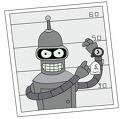As a big Futurama fan, I welcome the new episodes with some trepidation. I was mildly amused by the four direct to DVD movies since the show was canceled--and that's a criticism, as any four episodes of the show were far beyond "mildly amus[ing]." All too often shows have suffered in quality after the four-season mark; moreover, I felt the show had a nice conclusion with the season four finale and, to a lesser extent, the final movie. Admittedly, the show always had a quiet dignity missing from shows like Family Guy and Rock of Love, but the movies were too self-aware. However I would be lying if I said I didn't want to watch any of the new Futurama episodes--a promise I could make regarding nearly every other show on television.
However I'd like to extend this opinion of Futurama to a broader audience and broader assertion; and that is that Bender was one the best television characters of the millennial decade.

Empirically, Bender is a robot in the year 3000. The show's protagonist (Phillip Fry) meets and befriends Bender despite, and because of, Bender's chronic smoking, drinking, larceny, swearing and other debauchery.
On the out most level, Bender is just the best friend character necessary to comedic balance and seen in every nearly every competent show. However, Bender's selfish hedonism is particularly absurd given his existence as a robot--a tool meant to make people's lives easier. For years robots have been an appealing concept to modern society as they reject the weakness of people (such as sleepiness, fear, pain, etc).
When we think of robots, we think of the Terminator variations. It is a machine that does its duty without fail or hesitation. However, this robotic efficiency is a pipe dream. I can't even count on my shower faucet to give me hot water 100% of the time, so we have no reason to think our robots would perform perfectly. Bender is just an extreme to epitomize this point. He is a paradox of our technology; a dream creation that is, by all measurable rights, a complete failure...like much technology (Pippin, anybody?).
However Bender's rampant hedonism strikes a cord in the audience, as we find ourselves yearning to live such a carefree lifestyle. Bender does little work yet never starves. He can drink all night and never be hungover. He can swear and steal without regard for consequences. Bender is us--if we completely did away with those annoying inhibitions. He is the ego that Freud talked about, even though such worldly pleasures seem absurd to a robot we assume to be without desire or emotions.

Our commonality with Bender deepens even more when he embodies our own insecurities, failings and fears, though. Bender's one inhuman trait is his inability to mask himself. He cannot keep secrets and cannot act like somebody else. Everyone (audience and other characters) always know how Bender is feeling and what he is thinking because he is always showing or telling what he feels or thinks. Through this one fault, Bender taps into another common human experience: our desire to be real; our desire to quite acting, our desire to just accept who we are and be accepted for who we are by the world.
And though these insecurities seem broad, or even cliche, they are originally portrayed as no other character on Futurama (or other show for that matter) can be so refreshingly transparent. Bender has a reoccurring, and impossible, dream of being a Harlem Globetrotter. He also has a considerably more philosophical fear of being forgotten once he is dead/turned off/thrown away. Bender wants to know he made an impact on the people in his life--a theme deemed universal since the Jimmy Stewart classic It's A Wonderful Life. But above all these insecurities, Bender is afraid to be alone. As early as Futurama's third episode, Bender shows he loves his friends and can be cut quite deep when rejected by people. More than people need Bender as a tool, Bender needs people as friends. Bender needs people as friends even more than he needs them for victims in his aforementioned tomfoolery.

But Bender is also known for his perpetual hatred for humanity. While this is playing off the sci-fi stereotype of all robots eventually turning on humanity, it also taps into our most repressed and cynical thoughts. The world may not be full of crazy/annoying people, but it sure seems like those people do all the driving.
On a more lighthearted and ending note, Bender is a fine example of cultural blending as he is proudly Mexican (or at least built in Mexico). However, aside from the last name (Rodriquez) and motivation to save "senoritas," Bender displays no Mexican culture. He is a perfectly assimilated New Yorker in the sense that his Mexican identity is never used against or for him--however he does experience some discrimination as a robot, possibly proving that complete assimilation is impossible and thus not a virtue. Here we reach the last point: conformity can not be reached, so we must find strength in the diversity that is present in our society; even if said diversity includes metallic beings.
No comments:
Post a Comment